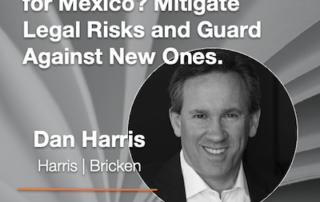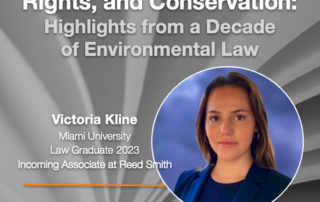
Emerging Litigation Podcast
Massive Mass Tort Settlements and Liability Forecasting
In this episode, we discuss Liability Forecasting and the role it plays in the administration of massive, sometimes multi-billion-dollar mass tort settlement trusts with guests Mark Eveland and Ed Silverman of Verus LLC, which provides litigation support services to law firms working on mass torts, such as case management and medical review services, settlement administration, business and advisory services, and analytics. Liability forecasting mechanisms were built to fairly and judiciously compensate current and future claimants for their injuries. Listen and learn more!
Navigating International Discovery
In this episode, we discuss navigating the complexities of international discovery with Ben Daniels of Robinson+Cole and the benefits of understanding jurisdictional differences and having specialized tools and strategies to cut through the complexities. As Ben notes, "if you litigate in a foreign court, discovery, as it is known in the U.S., is not going to happen. But parties often forget a powerful tool to get around those restrictions". Listen and learn more!
Fresh Produce Law, Contracts, and Risks
In this episode, we discuss Fresh Produce Transportation Law with Katy Esquivel of Esquivel Law Chartered and the challenges of transporting fresh fruits and vegetables from farms to stores in a safe and timely manner. What legal and reputational risks do growers, brokers, and shippers face? What laws come into play? What are the essential components of contracts among participants in the supply chain? As Katy notes, "there is nobody in this country with a more tangible vested interest in the safety of produce than growers and everyone along the supply chain". Listen and learn more!
A Shameless Plug for Our Content Services
Your content marketing is everything you’ve ever dreamed of. Right?

Critical Legal Content was founded by Tom Hagy, former Editor & Publisher of Mealey’s Litigation Reports and VP at LexisNexis, founder of HB, current litigation podcaster and editor-in-chief. CLC’s mission is to help smaller firms and service providers not only create content — blogs, articles, papers, webinars, podcasts (like the stuff on this site) — but also to get it out there. How? Via social media, this website, your website, and potential via our podcast and journal which we publish in collaboration with vLex Fastcase and Law Street Media. The goal is to attract readers and dizzy them with your brilliance.
*Inspired by actual events.
Create content like a real legal publisher.
Journal on Emerging Issues in Litigation
How Companies Seeking to Leave China for Mexico Can Mitigate Their Legal Risks and Protect Against New Ones
The Author Dan Harris (dan@harrisbricken.com) is co-founder of Harris Bricken where he focuses his practice on international law and protecting businesses in their foreign operations. A leading authority on the subject, he is also editor of the highly regarded China Law Blog, and a valued member of the Editorial Board of Advisors for the Journal of Emerging Issues in Litigation. Interviews with leading attorneys and other subject matter experts on new twists in the law and how the law is responding to new twists in the world. How Companies Seeking to Leave China for Mexico Can Mitigate Their Legal Risks and Protect Against New Ones "Chinese manufacturers commonly seek retaliation against foreign buyers that cease buying product from them. For this reason, it is critical that you line up your new suppliers (preferably in a country other than China) and have them ready to go before you even hint to anyone in China that you might cease or reduce production with an existing China supplier." Abstract: The author, one of the leading authorities on the legal issues related to international manufacturing, discusses the risks companies will face if they move their manufacturing out of China, what they should do to mitigate those risks, and what new risks they will face in a new country, such as Mexico. He comments on a variety of concepts, including manufacturing agreements, protection of intellectual property, strategies for a safe departure, potential retaliation tactics, and even personal security matters. Download the article now!
Climate Change, Property Rights, and Conservation: Highlights from a Decade of Environmental Law (2013–2023)
The Author Victoria Kline (linkedin.com/in/victoria-kline) just graduated from the University of Miami School of Law, and is an incoming associate at Jones Day. She focused her studies on environmental law, which also will be her area of practice. (Congratulations to Victoria on her graduation and getting her start at Reed Smith!) Interviews with leading attorneys and other subject matter experts on new twists in the law and how the law is responding to new twists in the world. Climate Change, Property Rights, and Conservation: Highlights from a Decade of Environmental Law (2013–2023) Abstract: The author discusses nine recent decisions—all but one handed down by the Supreme Court—that demonstrate the ongoing debate over responsibility for the effects of climate change, how the courts are essentially asked to strike a balance between environmental protection and economic development, the intersection of property rights and conservation, and how litigants fared with their arguments over different aspects of this important and, many would say, existential dilemma. The author concludes with an update from the United Nations Framework Convention on Climate Change and the establishment of a loss and damage fund for countries harmed by climate change. "The past decade has seen numerous legal challenges and landmark rulings in environmental law, reflecting the growing recognition of the critical importance of protecting the environment for current and future generations. From the Supreme Court’s decision in Michigan v. EPA to the recent Juliana v. United States case, the judicial branch has dramatically changed the way litigation can be used to protect the interests of the earth and its inhabitants." Download the article now!
Procedural Challenges to the IRS’s Compliance With the APA and Its Impact on Tax Litigation
The Author Jeffrey S. Luechtefeld (jeff.luechtefeld@chamberlainlaw.com) is a tax controversy and litigation attorney with Chamberlain, Hrdlicka, White, Williams, and Aughtry (Atlanta, Georgia) where he focuses his practice on resolving tax disputes with the Internal Revenue Service, administratively or through litigation. Jeff previously was a Special Trial Attorney for the IRS Office of Chief Counsel as well as a director in the tax controversy practice of a big four accounting firm. Interviews with leading attorneys and other subject matter experts on new twists in the law and how the law is responding to new twists in the world. Procedural Challenges to IRS Compliance With the APA and Its Impact on Tax Litigation Abstract: The Administrative Procedure Act (APA) places specific requirements on agencies of the federal government when engaged in a “rule making” that has the force and effect of law. Recently, the APA has become a focal point in tax litigation, due in large part to the IRS’s history of refusing to comply with the process mandated by the APA. This article focuses on procedural challenges to the IRS’s compliance with the APA based on the IRS’s history of non-compliance with the APA’s notice-and-comment requirement. It highlights recent trends in tax litigation and considers the future of APA challenges in this area. "IRS’s level of APA non-compliance matters significantly ... "APA challenges predicated on the IRS’s failure to adequately follow the APA’s notice-and-comment process are inherently fact-intensive endeavors ... "The challenging party should gauge the usefulness of the relief requested and balance that against the cost required to prevail ... "Ultimately, APA challenges are important, and may be necessary for a taxpayer to get to argue the merits of their case, but they do not often end the dispute with the IRS." Download the article now!










